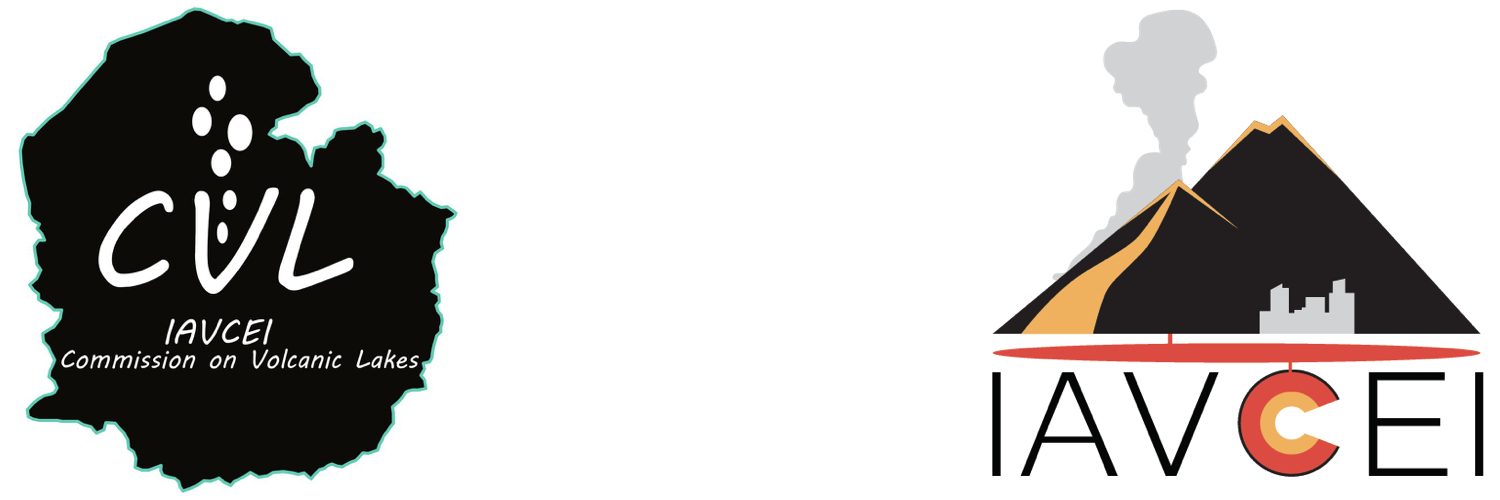Kusakabe Award 2023: Bruce W. Christenson
During CVL11-Azores, Bruce W. Christenson was awarded the 2023 Kusakabe Award. He was elected by the CVL Steering Committee out of three nominees (see procedure below), including Takeshi Ohba, Dmitri Rouwet and Bruce himself.
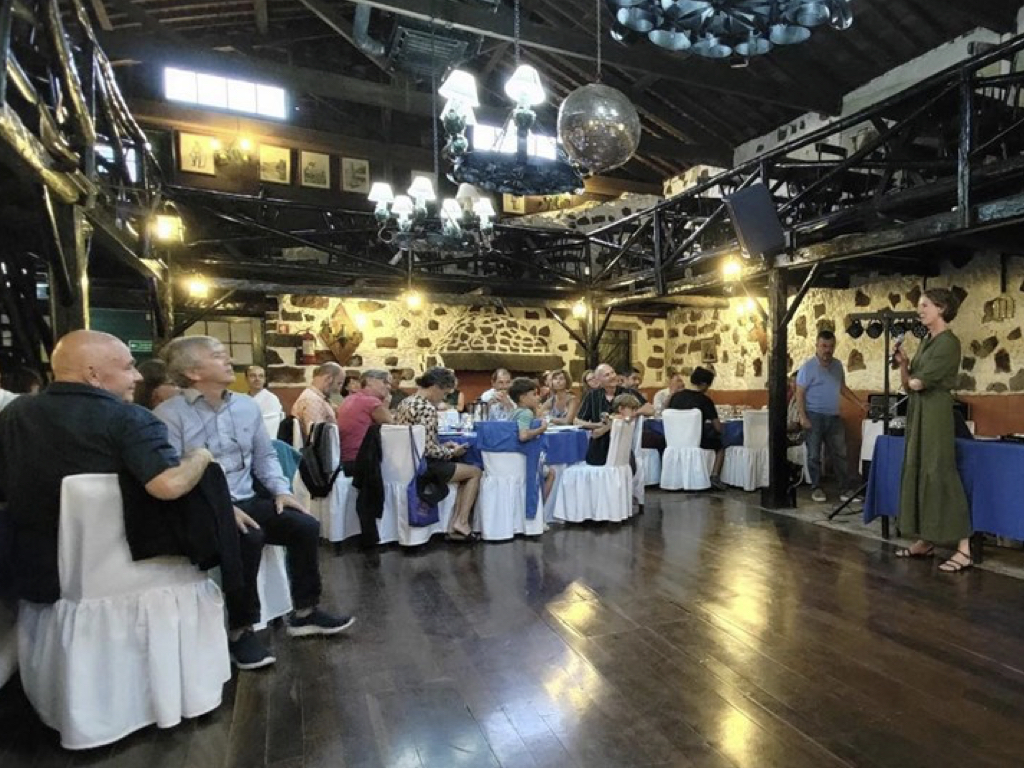
CVL-Leader Jen Lewicki announcing “and the winner is… “: Bruce!
Bruce has been a CVL lighthouse during the past four decades, being an outstanding scientist who has creatively applied geochemical and geophysical field observations, laboratory experiments, and modeling to the study of volcanic lakes, phreatic eruptions, and their hazards at locations around the world. The Kusakabe Award was received by his GNS colleague and newly elected CVL-Leader Agnes Mazot.
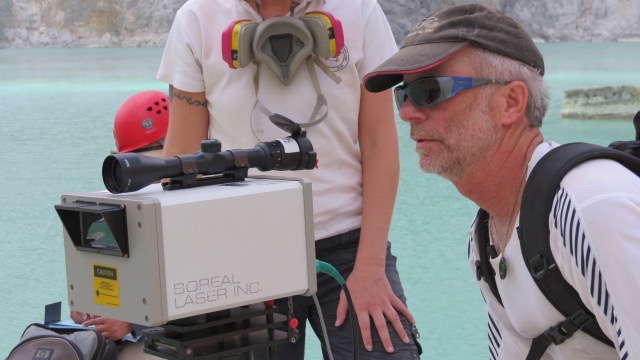
Bruce W. Christenson in action during the 2014 Kawah Ijen “Wet volcanoes” workshop.
Great job, Bruce! Congratulations on your magnificent carreer…
Kusakabe Award 2019: Johan “Joop” Varekamp
During CVL10-New Zealand, Joop Varekamp was awarded the 2019 Kusakabe Award. He was elected by the CVL Steering Committee out of three nominees (see procedure below), including Alain Bernard, Bruce Christenson and Joop himself.
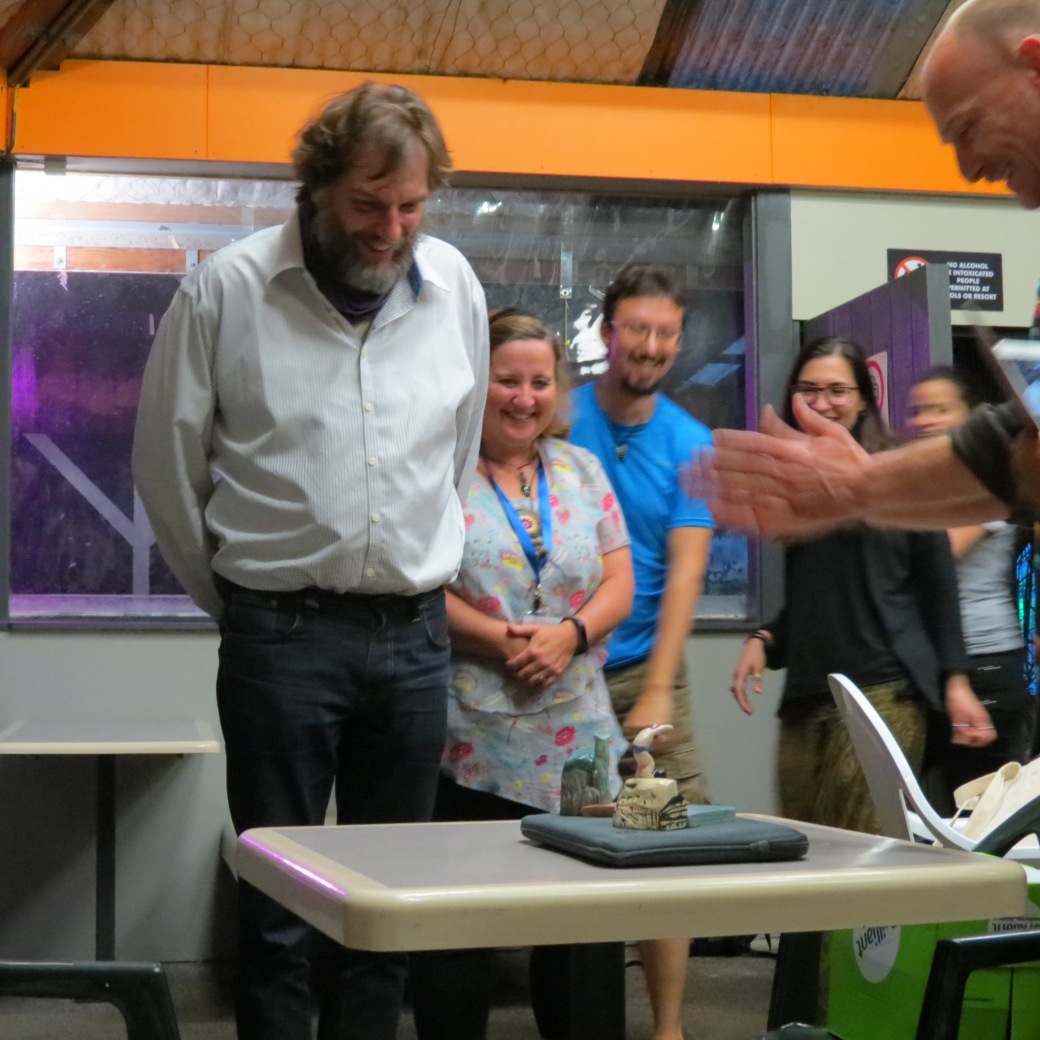
Congratulations Joop! Well deserved…
No one could better describe Joop’s carreer than his colleague and co-national Manfred van Bergen (University of Utrecht):
Johan (“Joop”) Varekamp’s career-long fascination for volcanic lakes has made him a genuine leader in this field. He became irreversibly attracted in Indonesia where he studied various crater lakes along the entire Sunda-Banda arc together with students and colleagues. Later he was involved in lake studies in Vanuatu, El Salvador and the Philippines, whereas Copahue volcano (Argentina/Chile) became the multifaceted center of his land-mark work on lakes and seepage streams during more than a decade. Two of his most outstanding and best cited papers, published around the turn of the century (together with Greg Pasternack and Gary Rowe) and dealing with the physical and chemical fundamentals of VL systematics, are vital and of enduring importance to our research field.
With his enviable creativity, enthusiasm and relentless energy Joop has been at the forefront of many innovations in VL research, always with a keen eye for establishing links with neighboring geosciences. As illustration of his taste for unpaved alleys: he explored the significance of deeply recycled cosmogenic iodine in lake water, the role photochemistry in regulating trace elements in acid seepage water, analogies between VL systems with environments on the surface of Mars and much more.
Altogether, Joop has been author/co-author of some 25 publications on VL-related research. One of his chief achievements was the appearance of special JVGR issues on volcanic lakes under his instigation and editorship (in 2000 together with Gary Rowe, 26 papers; in 2008 with Manfred van Bergen, 17 papers). He was driving force and organizer of three consecutive CVL workshops in 1996 (Crater Lake, Oregon), 2000 (Bali, Indonesia), 2004 (Caviahue, Argentina) as well as numerous field-based and other scientific events. In particular, the highly successful Oregon meeting gave CVL a well-timed boost. There can be no doubt that his long-term leadership of the commission has had a lasting impact on the field of VL research, both in substantially broadening it and in firmly establishing it as a flourishing discipline in volcanology.

The Kusakabe Award, art work by Marta Jorio @martajorio, representing Joop diving into Copahue’s crater lake.
Kusakabe Award 2016: Minoru Kusakabe
In March 2016, during the closing ceremony of the CVL9 workshop in Cameroon, the CVL Steering Committee awarded Minoru Kusakabe for his role as the “CVL founding father” and career-long dedication to Lake Nyos and, especially, for his open-mindedness towards the formation of local researchers. Minoru Kusakabe has been the Sensei of many Cameroonian students who are now able to follow up the monitoring of Lake Nyos. From 1986 to 2016 Minoru Kusakabe visited Cameroon and Lake Nyos 40 (!) times.
During the same occasion, Minoru Kusakabe received the title of Chevalier de la République du Cameroun, in name of the Cameroonian President, Paul Biya.
In his name and example, the CVL will award the “Kusakabe Award” every three years.
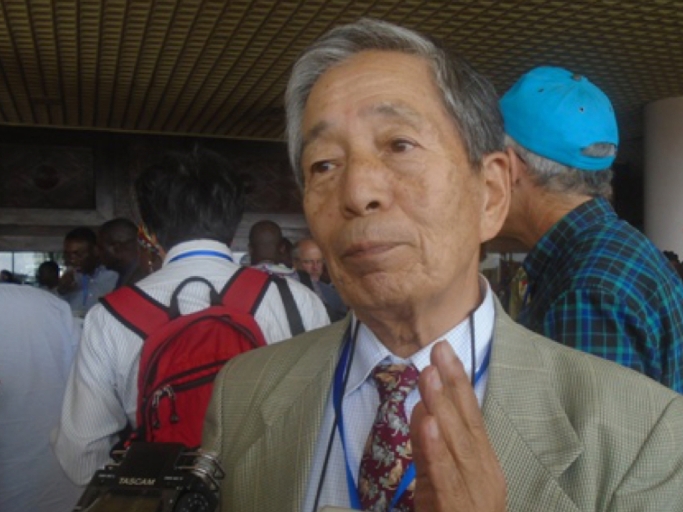
Prof. Em. Minoru Kusakabe during an interview at Hotel Mt Fébé (Yaounde, Cameroon), site of the CVL9 Scientific Sessions in March 2016. source internet.
The selection procedure enrolled to nominate candidates for the Kusakabe Award, to be handed over during CVL10-New Zealand (March 2019) and CVL11-Azores (September 2023) was as follows:
A panel of 8-9 referees* proposed 3 nominees to the CVL Steering Committee + Minoru Kusakabe that will democratically decide on the eventual Kusakabe awardee.
Criteria: The Kusakabe Award will go to a colleague who…
– has had a major scientific impact in our field;
– has shown a “life-time commitment” to volcanic lake research. This commitment can be expressed as being a “lake-pioneer”, a mentor of students, having dedicated to local situations, having an impact on society near lakes, etc
– is not a young researcher (for IAVCEI, young is <35 years)
*2019-KA: Manfred van Bergen (Universiteit Utrecht, the Netherlands), Yuri Taran (IGF-UNAM, Mexico), Bill Evans (USGS-Menlo Park, USA), Greg Tanyileke (IRGM, Cameroon), Aka Festus Tongwa (IRGM, Cameroon), Franco Tassi (Università di Firenze, Italy), Takeshi Ohba (Tokai University, Japan), Dmitri Rouwet (INGV, Bologna, Italy).
*2023-KA: Orlando Vasselli (University of Florence), Giovanni Chiodini (INGV, Bologna, Italy), Bertram Boehrer (UFZ, Magdeburg, Germany), Yuri Taran (IGF-UNAM, Mexico), Bill Evans (USGS-Menlo Park, USA), Fátima Viveiros (IVAR, Azores, Portugal), Corentin Caudron (ULB, Belgium), Dmitri Rouwet (INGV, Bologna, Italy).
Note: If Steering Committee members resulted nominees they were excluded from the final voting.
